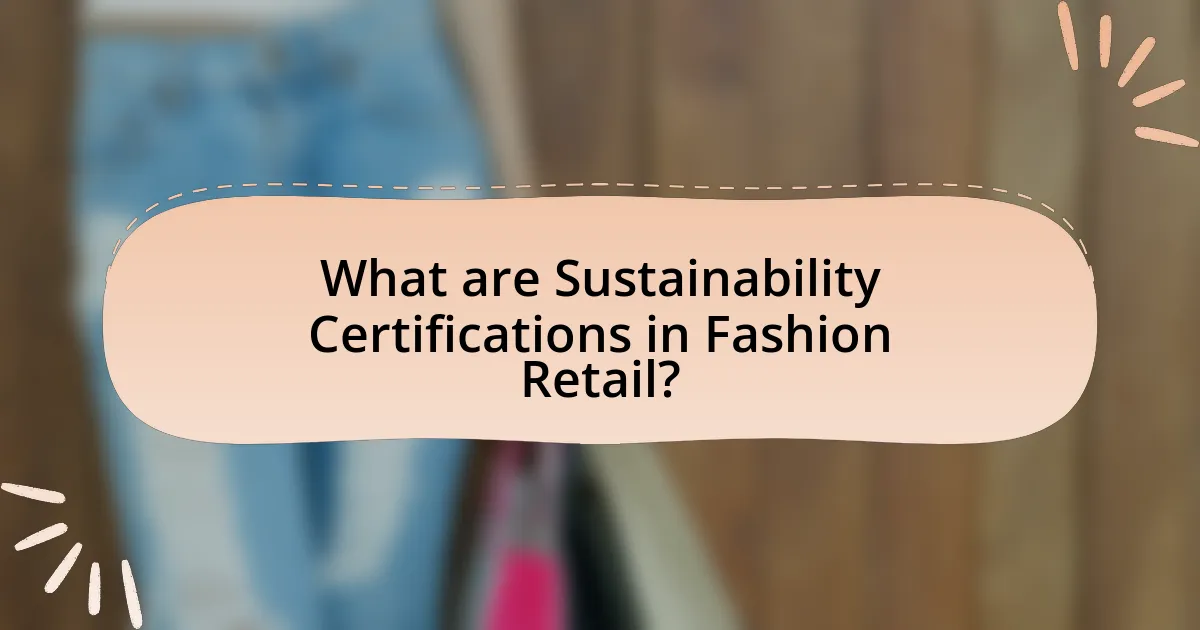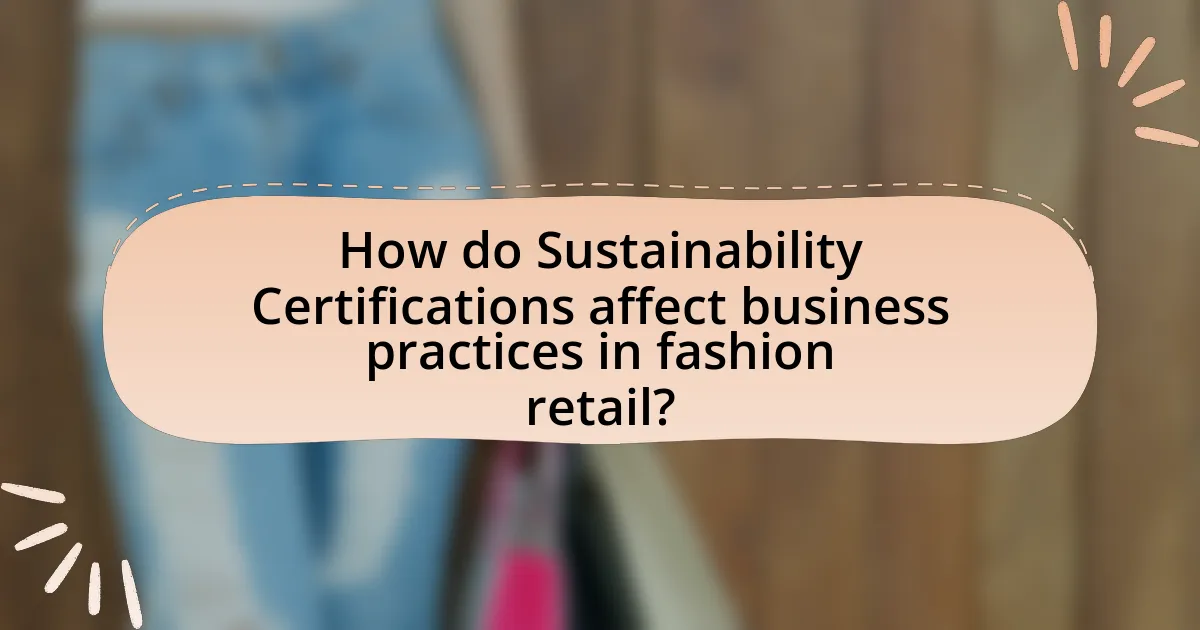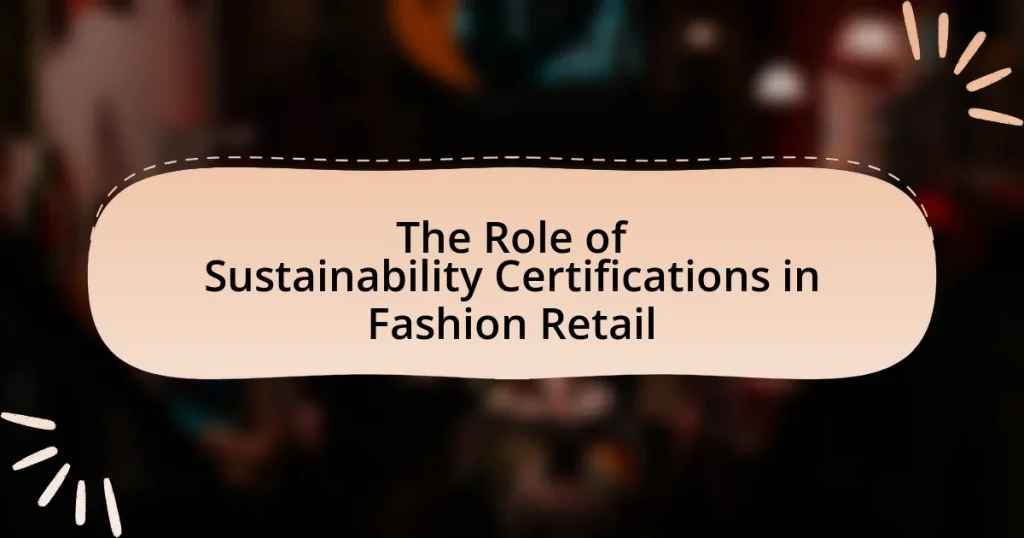Sustainability certifications in fashion retail are formal recognitions that validate a brand’s compliance with environmental and social standards, influencing consumer purchasing decisions and promoting ethical practices. Key certifications include Global Organic Textile Standard (GOTS), Fair Trade, and OEKO-TEX Standard 100, each focusing on different aspects of sustainability such as ethical labor and material sourcing. The article explores the impact of these certifications on brand reputation, operational efficiency, and consumer trust, while also addressing the challenges brands face in obtaining and maintaining these certifications. Additionally, it highlights emerging trends and the role of technology in enhancing certification processes within the fashion industry.

What are Sustainability Certifications in Fashion Retail?
Sustainability certifications in fashion retail are formal recognitions that verify a brand’s adherence to environmental and social standards. These certifications assess various aspects such as ethical labor practices, sustainable sourcing of materials, and reduced environmental impact. For instance, certifications like Global Organic Textile Standard (GOTS) and Fair Trade ensure that products meet specific ecological and social criteria, promoting transparency and accountability in the fashion supply chain. The presence of these certifications can influence consumer purchasing decisions, as studies indicate that 66% of consumers are willing to pay more for sustainable brands, highlighting the growing importance of sustainability in the retail sector.
How do Sustainability Certifications impact the fashion industry?
Sustainability certifications significantly impact the fashion industry by promoting environmentally friendly practices and enhancing brand credibility. These certifications, such as Global Organic Textile Standard (GOTS) and Fair Trade, require compliance with strict environmental and social criteria, which encourages brands to adopt sustainable sourcing, production, and labor practices. For instance, a study by the Fashion Institute of Technology found that brands with sustainability certifications experienced a 20% increase in consumer trust and loyalty, demonstrating that certifications can lead to higher sales and market share. Additionally, certifications help consumers make informed choices, driving demand for sustainable products and pushing the entire industry towards more responsible practices.
What are the key types of Sustainability Certifications available?
The key types of sustainability certifications available include Global Organic Textile Standard (GOTS), OEKO-TEX Standard 100, Fair Trade Certified, and Cradle to Cradle Certified. GOTS certifies organic textiles, ensuring they meet environmental and social criteria throughout the supply chain. OEKO-TEX Standard 100 tests textiles for harmful substances, promoting safety for consumers. Fair Trade Certified focuses on equitable trade practices, ensuring fair wages and working conditions for producers. Cradle to Cradle Certified evaluates products based on their environmental impact and sustainability throughout their lifecycle. These certifications provide consumers with assurance regarding the sustainability practices of fashion brands.
How do these certifications differ from one another?
Sustainability certifications in fashion retail differ primarily in their focus areas, criteria, and assessment processes. For instance, the Global Organic Textile Standard (GOTS) emphasizes organic fibers and environmentally friendly production processes, while the Fair Trade certification prioritizes fair labor practices and equitable trade. Additionally, the OEKO-TEX Standard 100 assesses the safety of textiles for human health, focusing on harmful substances. Each certification has distinct requirements and methodologies, which cater to various aspects of sustainability, such as environmental impact, social responsibility, and consumer safety. This differentiation allows brands to choose certifications that align with their specific sustainability goals and consumer expectations.
Why are Sustainability Certifications important for consumers?
Sustainability certifications are important for consumers because they provide verified assurance that products meet specific environmental and ethical standards. These certifications help consumers make informed purchasing decisions by identifying products that are produced sustainably, thereby reducing their ecological footprint. For instance, certifications like Fair Trade and Global Organic Textile Standard (GOTS) ensure that products are made with environmentally friendly practices and fair labor conditions. This transparency fosters trust between consumers and brands, as evidenced by a 2021 survey indicating that 66% of global consumers are willing to pay more for sustainable brands.
How do certifications influence consumer purchasing decisions?
Certifications significantly influence consumer purchasing decisions by enhancing trust and credibility in products. Research indicates that 66% of consumers are willing to pay more for sustainable brands, demonstrating that certifications like Fair Trade or organic labels can sway buying behavior. These certifications serve as signals of quality and ethical practices, leading consumers to perceive certified products as more reliable and aligned with their values. Furthermore, a study published in the Journal of Business Research found that consumers are more likely to choose products with recognized certifications, as these labels reduce perceived risk and increase purchase intention.
What role do certifications play in promoting ethical fashion?
Certifications play a crucial role in promoting ethical fashion by providing a standardized framework that verifies and communicates the sustainability practices of brands. These certifications, such as Fair Trade, GOTS (Global Organic Textile Standard), and B Corp, establish criteria for ethical labor practices, environmental stewardship, and transparency in supply chains. For instance, GOTS ensures that textiles are made from organic fibers and produced in environmentally and socially responsible ways, which helps consumers make informed choices. By endorsing brands that meet these rigorous standards, certifications enhance consumer trust and encourage more companies to adopt ethical practices, ultimately driving the fashion industry towards greater sustainability.
What challenges do brands face in obtaining Sustainability Certifications?
Brands face several challenges in obtaining Sustainability Certifications, primarily including high costs, complex requirements, and lack of standardized criteria. The financial burden associated with certification processes can deter brands, as they often require significant investments in sustainable practices and documentation. Additionally, the complexity of the certification requirements can overwhelm brands, particularly smaller ones that may lack the resources or expertise to navigate the process effectively. Furthermore, the absence of universally accepted standards for sustainability certifications leads to confusion and inconsistency, making it difficult for brands to determine which certifications are most relevant and credible for their specific industry. These challenges collectively hinder brands’ ability to achieve and maintain sustainability certifications in the fashion retail sector.
What are the common barriers to certification for fashion retailers?
Common barriers to certification for fashion retailers include high costs, complex compliance requirements, and lack of awareness or understanding of certification processes. High costs can deter smaller retailers from pursuing certification, as they may not have the financial resources to invest in necessary changes or audits. Complex compliance requirements often involve extensive documentation and adherence to specific standards, which can be overwhelming for retailers lacking dedicated sustainability teams. Additionally, many retailers may not be fully aware of the benefits of certification or the steps involved, leading to hesitation in pursuing these certifications. According to a report by the Global Fashion Agenda, 60% of fashion companies cite cost as a significant barrier to sustainability initiatives, highlighting the financial challenges faced in obtaining certifications.
How can brands overcome these challenges?
Brands can overcome challenges related to sustainability certifications by integrating transparent supply chain practices and engaging in continuous education about sustainable practices. Transparent supply chains allow brands to demonstrate compliance with certification standards, thereby building consumer trust. For instance, a study by McKinsey & Company highlights that 66% of consumers are willing to pay more for sustainable brands, indicating that transparency can enhance brand loyalty and sales. Additionally, ongoing education for employees and stakeholders about sustainability can foster a culture of responsibility and innovation, enabling brands to adapt to evolving consumer expectations and regulatory requirements effectively.
How do Sustainability Certifications contribute to brand reputation?
Sustainability certifications enhance brand reputation by signaling commitment to environmentally and socially responsible practices. Brands that obtain certifications, such as Fair Trade or Global Organic Textile Standard, demonstrate adherence to rigorous standards, which can increase consumer trust and loyalty. Research indicates that 66% of global consumers are willing to pay more for sustainable brands, highlighting the positive impact of certifications on purchasing decisions. Furthermore, brands with sustainability certifications often experience improved public perception and differentiation in a competitive market, as consumers increasingly prioritize ethical considerations in their buying choices.
What are the implications of Sustainability Certifications on supply chains?
Sustainability certifications significantly impact supply chains by enhancing transparency, improving efficiency, and fostering consumer trust. These certifications require companies to adhere to specific environmental and social standards, which often leads to the optimization of resource use and waste reduction. For instance, a study by the Global Sustainability Initiative found that companies with sustainability certifications reported a 20% reduction in operational costs due to improved resource management. Furthermore, certifications can serve as a competitive advantage, as consumers increasingly prefer brands that demonstrate commitment to sustainable practices, thereby influencing purchasing decisions and brand loyalty.

How do Sustainability Certifications affect business practices in fashion retail?
Sustainability certifications significantly influence business practices in fashion retail by promoting environmentally responsible sourcing, production, and consumption. These certifications, such as Global Organic Textile Standard (GOTS) and Fair Trade, compel retailers to adopt sustainable practices to meet certification criteria, which often include reducing waste, using eco-friendly materials, and ensuring fair labor conditions. For instance, a study by the Fashion Institute of Technology found that brands with sustainability certifications reported a 20% increase in consumer trust and loyalty, leading to higher sales. This demonstrates that sustainability certifications not only guide operational changes but also enhance brand reputation and market competitiveness in the fashion retail sector.
What changes do brands need to implement to achieve certification?
Brands need to implement sustainable practices across their supply chains to achieve certification. This includes adopting environmentally friendly materials, ensuring ethical labor practices, and minimizing waste throughout production processes. For instance, certifications like Global Organic Textile Standard (GOTS) require brands to use organic fibers and adhere to strict environmental and social criteria. Additionally, brands must conduct regular audits and maintain transparency in their operations to demonstrate compliance with certification standards. These changes not only align with certification requirements but also enhance brand reputation and consumer trust in the increasingly eco-conscious market.
How do these changes impact operational efficiency?
Sustainability certifications enhance operational efficiency by streamlining processes and reducing waste. These certifications often require companies to adopt best practices that optimize resource use, leading to lower operational costs. For instance, a study by the Global Fashion Agenda found that brands implementing sustainable practices can reduce their supply chain costs by up to 30% through improved resource management and waste reduction. Additionally, certified companies often experience increased consumer trust and loyalty, which can lead to higher sales and improved market positioning, further contributing to operational efficiency.
What are the financial implications of pursuing certifications?
Pursuing certifications in sustainability can lead to significant financial implications for fashion retailers. These certifications often require upfront investment in training, auditing, and compliance processes, which can range from a few thousand to tens of thousands of dollars depending on the certification type. However, the long-term financial benefits can outweigh these initial costs, as certified companies may experience increased consumer trust, higher sales, and access to new markets. For instance, a study by McKinsey & Company found that brands with sustainability certifications can see a sales increase of up to 20% due to growing consumer demand for ethically produced goods. Additionally, certifications can lead to cost savings through improved operational efficiencies and waste reduction, further enhancing profitability.
How do certifications influence collaboration within the fashion industry?
Certifications significantly enhance collaboration within the fashion industry by establishing standardized criteria that stakeholders can trust. These certifications, such as Global Organic Textile Standard (GOTS) or Fair Trade, provide a common language and framework for brands, suppliers, and retailers, facilitating partnerships based on shared values of sustainability and ethical practices. For instance, a study by the Fashion Institute of Technology found that brands with sustainability certifications reported a 30% increase in collaborative projects with suppliers, as these certifications reduce uncertainty and foster transparency in sourcing and production processes. This trust encourages joint initiatives, such as co-developing sustainable materials or sharing best practices, ultimately leading to a more cohesive and responsible fashion ecosystem.
What partnerships are formed as a result of certification efforts?
Partnerships formed as a result of certification efforts in fashion retail include collaborations between brands and certification organizations, NGOs, and supply chain stakeholders. These partnerships aim to enhance sustainability practices, improve transparency, and ensure compliance with environmental and social standards. For instance, brands often partner with organizations like the Global Organic Textile Standard (GOTS) or the Fair Trade Certification to validate their sustainable practices, which in turn fosters trust with consumers and enhances brand reputation. Additionally, collaborations with NGOs can lead to joint initiatives that promote sustainable sourcing and ethical labor practices, further solidifying the brand’s commitment to sustainability.
How do collaborations enhance sustainability practices?
Collaborations enhance sustainability practices by pooling resources, knowledge, and expertise among various stakeholders, leading to more effective and innovative solutions. For instance, partnerships between fashion brands and environmental organizations can result in the development of sustainable materials and production methods that individual companies may not achieve alone. A notable example is the collaboration between H&M and the Ellen MacArthur Foundation, which focuses on circular fashion principles, demonstrating how shared goals can drive industry-wide change. Such collaborations not only amplify the impact of sustainability initiatives but also foster a culture of accountability and transparency within the fashion retail sector.

What future trends are emerging in Sustainability Certifications for fashion retail?
Future trends in sustainability certifications for fashion retail include increased consumer demand for transparency, the rise of digital certifications, and a focus on circular economy principles. Consumers are increasingly seeking brands that provide clear information about their sustainability practices, leading to a push for certifications that emphasize traceability and ethical sourcing. Digital certifications, enabled by blockchain technology, are gaining traction as they offer real-time verification of sustainability claims, enhancing trust. Additionally, certifications are evolving to incorporate circular economy metrics, encouraging brands to adopt practices that minimize waste and promote recycling. These trends reflect a broader shift towards accountability and innovation in the fashion industry.
How is technology shaping the future of Sustainability Certifications?
Technology is significantly shaping the future of sustainability certifications by enhancing transparency, efficiency, and accessibility in the certification process. Advanced technologies such as blockchain provide immutable records of supply chain practices, allowing consumers and businesses to verify sustainability claims in real-time. For instance, companies like Provenance utilize blockchain to trace the origins of materials, ensuring that sustainability standards are met throughout the production process. Additionally, artificial intelligence and machine learning are streamlining the assessment of compliance with sustainability criteria, enabling faster and more accurate evaluations. According to a report by the World Economic Forum, the integration of these technologies can reduce certification costs by up to 30%, making sustainability certifications more attainable for smaller brands. This technological evolution not only fosters greater trust among consumers but also encourages more brands to pursue sustainable practices, ultimately driving the fashion industry towards a more sustainable future.
What role do digital platforms play in certification processes?
Digital platforms facilitate certification processes by providing streamlined access to information, resources, and verification systems. These platforms enable organizations to efficiently manage documentation, track compliance, and communicate with stakeholders, thereby enhancing transparency and trust in the certification process. For instance, platforms like blockchain technology ensure the integrity of certification data by creating immutable records, which can be verified by all parties involved. This technological integration not only accelerates the certification timeline but also reduces costs associated with traditional methods, as evidenced by a report from the World Economic Forum highlighting that digital solutions can cut certification costs by up to 30%.
How can data analytics improve certification outcomes?
Data analytics can improve certification outcomes by providing insights into consumer behavior, operational efficiency, and compliance with sustainability standards. By analyzing data from various sources, organizations can identify trends and gaps in their sustainability practices, enabling them to make informed decisions that enhance their certification processes. For instance, a study by McKinsey & Company found that companies leveraging data analytics in their sustainability efforts can achieve up to 20% higher efficiency in resource use, which directly impacts their ability to meet certification requirements. Additionally, data analytics can facilitate real-time monitoring of compliance, ensuring that organizations maintain the standards necessary for certification and can quickly address any deviations.
What best practices should brands follow to maintain their certifications?
Brands should regularly review and update their sustainability practices to maintain their certifications. This involves conducting internal audits to ensure compliance with certification standards, engaging in continuous training for employees on sustainability practices, and actively seeking feedback from stakeholders to identify areas for improvement. Additionally, brands should document all sustainability efforts and maintain transparent communication with certifying bodies to demonstrate ongoing commitment. Research indicates that companies that prioritize sustainability not only retain certifications but also enhance their brand reputation and customer loyalty, as seen in the 2021 Global Sustainability Report by Nielsen, which found that 66% of consumers are willing to pay more for sustainable brands.
How can brands ensure ongoing compliance with certification standards?
Brands can ensure ongoing compliance with certification standards by implementing a robust internal auditing system and regularly updating their practices to align with evolving standards. This involves conducting periodic assessments of their processes, materials, and supply chains to identify areas for improvement. For instance, brands can utilize third-party audits to validate compliance and receive feedback on necessary adjustments. Additionally, continuous training for employees on certification requirements and sustainability practices fosters a culture of compliance. Research indicates that companies actively engaging in regular compliance checks and employee education are more likely to maintain their certification status, as seen in the case of the Global Organic Textile Standard, which emphasizes the importance of ongoing evaluation and adaptation.
What strategies can brands adopt to communicate their certification status effectively?
Brands can adopt several strategies to communicate their certification status effectively, including leveraging digital platforms, utilizing clear labeling, and engaging in storytelling. Digital platforms, such as social media and websites, allow brands to showcase their certifications prominently, reaching a wider audience. Clear labeling on products, which includes certification logos and concise explanations, helps consumers quickly understand the significance of the certification. Engaging storytelling that highlights the brand’s commitment to sustainability and the impact of the certification can create an emotional connection with consumers. Research indicates that 66% of consumers are willing to pay more for sustainable brands, underscoring the importance of effective communication regarding certification status.




